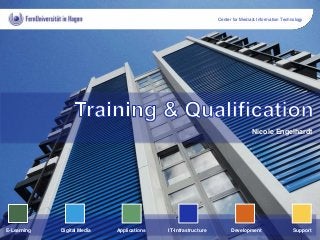
Training and qualification, FernUniversität in Hagen
- 1. Center for Media & Information Technology ApplicationsE-Learning DevelopmentIT-InfrastructureDigital Media Support Nicole Engelhardt
- 2. | 06.07.2016Folie 2 ZMI | Coordination Office for E-Learning & Educational Technology Module 1 teaching & learning Module 2 testing & assessment student counseling evaluating Module 3 developing innovations in teaching & learning Training program „Professional Teaching Competence in Higher Education Institutions“
- 3. | 06.07.2016Folie 3 ZMI | Coordination Office for E-Learning & Educational Technology • Network of Higher Education Didactics North Rhine-Westfalia • German Society for Higher Education Didactics (DGHD) Network • Each module contains 60 – 80 work units in total • Average duration between 2-4 years Workload • In general: teaching staff • Especially: young academics Target group Some Facts & Figures
- 4. | 06.07.2016Folie 4 ZMI | Coordination Office for E-Learning & Educational Technology Our Course Formats Our portfolio trainings & workshops (e-learning, blended learning, f2f) counseling & coaching peer counseling peer observing Our claim activity-oriented in step with actual practice science-based
- 5. | 06.07.2016Folie 5 ZMI | Coordination Office for E-Learning & Educational Technology Our Challenge: 70-20-10 Model
- 6. | 06.07.2016Folie 6 ZMI | Coordination Office for E-Learning & Educational Technology Our ideas to push social & experiental learning Sociallearning • (more) communities of practice • (more) peer coaching & observing • (more) regular meet-ups • q- & a-tool • internal social network • ... Self-learning-portal • tutorials (screencasts) • good practice reports (i.e. videos, podcasts) • checklists (how to ...) • Examples („patterns“) • visualized tool guide • questions to support reflection of own experiences • ...
- 7. | 06.07.2016Folie 7 ZMI | Coordination Office for E-Learning & Educational Technology How can we ... ... appreciate informal performance in formal certificates? ... increase experiential learning? ... go along with the permanent changes regarding to new technologies? What are your ideas? Our questions
- 8. | 06.07.2016Folie 8 ZMI | Coordination Office for E-Learning & Educational Technology Images Book & Glasses: Hans | pixabay.com Pen & Calculator: mediations | pixabay.com Bulb: artsvector | pixabay.com Map North Rhine Westfalia: d-maps.com Calendar: tigerlily713 | pixabay.com Albert Einstein: skeeze | pixabay.com 70-20-10: https://www.scil-blog.ch/blog/2015/10/09/702010-modell-warum-so-aktuell-warum-ueberhaupt- und-wie-gut-sind-organisationen-vorbereitet/ Working group: shanegaughan | pixabay.com Social Media: woerterhexe | pixabay.com Question mark: PIX1861 | pixabay.com Ressources
Editor's Notes
- * Establishing a self learning portal for staff members (to support more informal staff development) * Organising change management processes (corresponding to launch new learning and teaching technologies) * Staff member training programs
- Module I The basic module serves to teach basic skills in higher education didactics. The focus lies on the organization of learning processes as they facilitate learning situations, instructional periods as well as the support of self-studying techniques. Module II The expansion module focuses on specific aspects of teaching and learning in higher education and pays attention to discipline-specific issues; this module also continues and further develops the work in topic areas covered in the basic module. In addition, the expansion module adds further topic areas: Testing and Assessment – Student Counseling – Evaluating. Module III The immersion module provides higher education teachers with the opportunity to further continue their qualification and develop their skills in areas of their own fields of interest during self-directed learning periods. This module features the topic area “Developing innovations in Teaching and Learning” as a main training area. During this module, participants typically focus on topics or projects of their choice within higher education.
- The advanced training program „Professional Teaching Competence in Higher Education Institutions“ has been developed in coordination with the “Network of Higher Education Didactics North Rhine Westphalia”. Its setup follows The guidelines of the German Society for Higher Education Didactics (DGHD). These serve as guidelines for the program planning of higher education didactic institutions and networks throughout Germany, International standards, Higher Education Policy and Legislation which demands educational competence as one of the requirements for the appointment of higher education teaching personal (§ 36 Abs. 1 Ziffer 2 HZG NRW). This competence can be demonstrated by the certificate “Professional Teaching Competence in Higher Education Institutions”.
- Trainings & Workshops Individuelle Beratung / Lehrcoaching Kollegiale Beratung Kollegiale Hospitation Handlungsorientiert Praxisnah
- Comunities of practice Kollegiale Beratung Kollegiale Hospitation „Stammtische“ Q- & A-Tools Internes Netzwerk Wettbewerbe (challenges) Self learning portal Tutorials Good practice examples Checklists Wikis (technical - didactical – organisational) Tool Guide (Visualisiert) Offene Fragen: Anerkennung informeller Leistungen (Beispiel: Lehre im Pädagogokstudium)
